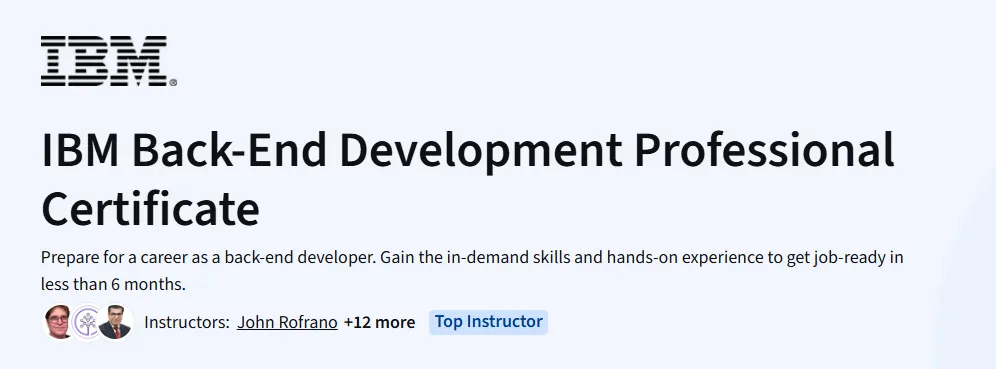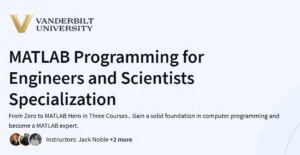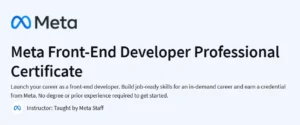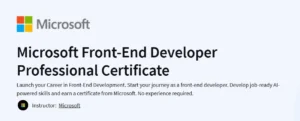What will you learn in IBM Back-End Development Professional Certificate Course
Develop server-side applications using Node.js, Express, Python, and Django.
Build RESTful APIs and work with databases like MongoDB and PostgreSQL.
Apply DevOps principles for deployment and continuous integration.
Use GitHub, Docker, and cloud tools like IBM Cloud and Kubernetes.
Debug, test, and secure back-end applications.
Program Overview
1. Introduction to Software Engineering
⏱️ 1 week
Topics: Software development lifecycle, Agile, DevOps, version control.
Hands-on: GitHub repositories and project management basics.
2. Python for Web Development
⏱️ 2 weeks
Topics: Python syntax, functions, Flask basics.
Hands-on: Build and run a basic web server using Flask.
3. Developing Back-End Apps with Python and Django
⏱️ 3 weeks
Topics: Django models, views, routing, templates, security.
Hands-on: Full CRUD Django web app with authentication.
4. JavaScript for Back-End Development
⏱️ 2 weeks
Topics: ES6+, asynchronous JavaScript, Node.js intro.
Hands-on: Small backend utilities with JavaScript and Node.
5. Working with Databases
⏱️ 2 weeks
Topics: SQL basics, PostgreSQL, MongoDB, ORM, CRUD operations.
Hands-on: Database queries and integrations in backend apps.
6. Back-End Development with Node.js and Express
⏱️ 3 weeks
Topics: REST APIs, middleware, routing, error handling.
Hands-on: Build RESTful APIs with authentication and validation.
7. Version Control and GitHub
⏱️ 1 week
Topics: Git commands, GitHub workflow, branching, pull requests.
Hands-on: Code versioning and team collaboration exercises.
8. Application Security Best Practices
⏱️ 2 weeks
Topics: Authentication, HTTPS, hashing, OWASP threats.
Hands-on: Secure back-end app configuration.
9. Containers and Microservices with Docker
⏱️ 2 weeks
Topics: Docker basics, container orchestration, microservices.
Hands-on: Containerize Node and Python apps with Dockerfiles.
10. DevOps and CI/CD Fundamentals
⏱️ 2 weeks
Topics: Pipelines, GitHub Actions, deployment, testing automation.
Hands-on: Implement CI/CD workflows for back-end apps.
11. Deploying Back-End Apps with Cloud Platforms
⏱️ 2 weeks
Topics: IBM Cloud, Kubernetes, scaling, logging, monitoring.
Hands-on: Deploy and manage apps on IBM Cloud.
12. Capstone Project
⏱️ 2 weeks
Topics: Real-world development scenario combining all learned skills.
Hands-on: Build, test, secure, containerize, and deploy a full back-end application.
Get certificate
Job Outlook
High Demand: Backend developers are essential in nearly every tech company.
Career Roles: Back-End Developer, Full Stack Developer, API Developer, Cloud Engineer.
Salary Potential: $90,000–$130,000 per year depending on location and skill level.
Freelance Work: Popular for contract-based API development, Django/Node.js projects, and deployments.
Specification: IBM Back-End Development Professional Certificate
|
FAQs
- No advanced coding is required to start.
- Basic familiarity with Python or JavaScript helps but isn’t mandatory.
- The course teaches from fundamentals to advanced use.
- Hands-on labs build skills progressively.
- Ideal for beginners transitioning into software development.
- It’s skills-focused, not theory-heavy like CS degrees.
- Faster and job-oriented training in backend tools.
- Emphasizes projects and applied coding experience.
- Great for career switchers needing quick entry.
- Can complement but not fully substitute a CS degree.
- Core backend concepts remain the same across clouds.
- Skills in Docker, Kubernetes, CI/CD are platform-independent.
- IBM Cloud knowledge builds strong fundamentals.
- Easy to adapt later to AWS, Azure, or GCP.
- Employers value cloud flexibility over brand-specific knowledge.
- Build RESTful APIs with Node.js and Django.
- Create CRUD applications with authentication.
- Integrate relational and NoSQL databases.
- Containerize apps with Docker for deployment.
- Capstone project combines all skills into a deployable backend app.
- Back-End Developer (entry to mid-level).
- Full Stack Developer (with added frontend skills).
- API Developer or Integration Specialist.
- Junior Cloud Engineer or DevOps Associate.
- Freelance backend projects (Node/Django-based).





